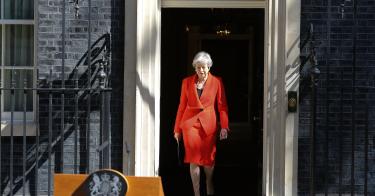British Prime Minister Theresa May’s resignation as party leader on Friday is the prelude to her departure from No. 10 Downing Street in July. Her end was years in coming, but while many leaders are felled by a lack of leadership, May suffered instead from a failure of followership.
May was an example of a common pattern in British politics, that of a dominant party leader who is followed by a less successful one from the same party. After Margaret Thatcher, came John Major. After David Cameron, Theresa May. It is in the nature of things that the sequel plays in a minor key.
In fact, in my judgment, May ranks behind only Anthony Eden, who in 1956 made a mess of the Suez Crisis, as the worst British prime minister since 1945. Nor was she in office very long: her short tenure of three years ranks her just ahead of Gordon Brown, who followed Tony Blair.
It is an illusion that great men are great in all seasons. Winston Churchill was Britain’s greatest wartime prime minister from 1940 to 1945, but when he served again from 1951 to 1955, in peacetime, his gifts showed to less advantage. He was at his finest when he could concentrate his genius solely on victory.
By the same token, I have often commented that May could have been a successful prime minister in a different age, because she has genuine talents. Above all, inside a settled system, she was an effective administrator. Unfortunately, she was tasked with presiding over Brexit, an unsettled system.
As a result, her failings came through more clearly than her gifts. She did not have a creative mind, so she was not a policy entrepreneur. She was also notoriously uncomfortable in dealing with people. The result was two failures that closely resembled each other, and together drove her from office.
The first was the election campaign of 2017. I supported her decision to call an election, and even in retrospect, it was a gamble worth taking. But gambles are ultimately judged on whether you win or lose, and, starting with a massive lead in the polls, May managed to stumble to a tie. That’s a failure.
Why? Because she was an inept campaigner who relied on a tiny coterie of people to draft the policies on which she fought the election. When those policies turned out to be very unpopular, May neither dumped them decisively, nor possessed the skill to win the public to her side.
The same thing happened with Brexit. May again relied on a small inner circle to define her approach to exiting the European Union. That approach was inconsistent with her own early speeches on the subject. It also alienated many of her colleagues and convinced almost no one in the public or in Parliament.
May’s fundamental problem was not that she was betrayed by her supporters. It was that, not being the sort of person to come up with ideas or to engage broadly with her supporters, she advanced in directions that commanded no backing. She led, but she had — and deserved — no followers.
So now her job will soon be vacant again. The front-runner is Boris Johnson, the former foreign secretary and mayor of London. But assume nothing. Johnson will know that the only front-runner since 1945 who has actually won the job was Eden, and he served briefly (1955-1957).
But Johnson does have one advantage. He is a man with ideas. Theresa May’s tenure in office shows that the old dichotomy that advisers advise and leaders lead is wrong. Leaders cannot be effective unless they possess the ability to assess the advice they receive. And that was a gift that May sadly lacked.
This piece originally appeared in Newsday



